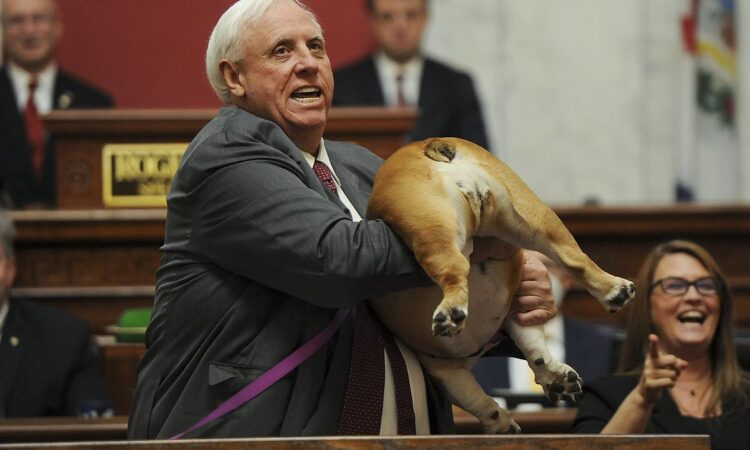West Virginia Governor Jim Justice files $1B lawsuit accusing Carter Bank of ‘predatory’ loan schemes after his companies racked up debt of $740M

- Justice and his family filed the lawsuit on Friday against Carter Bank and Trust
- They accused the bank of trapping family’s businesses in ‘predatory’ loans
- Carter Bank, based in Virginia, calls the allegations false and misleading
West Virginia Governor Jim Justice has filed a $1 billion lawsuit against a regional bank, accusing the lender of trapping his family businesses in a ‘predatory’ loan scheme.
The federal lawsuit filed on Friday names Virginia-based Carter Bank and Trust as a defendant, as well as the bank’s CEO Litz Van Dyke and members of the company’s board of directors.
Justice is a plaintiff in the suit alongside his wife, son, and more than a dozen businesses in the family’s business empire, which includes vast holdings of coal mines and farms, and a luxury resort property.
The suit accuses Carter Bank of trapping the Justice companies in a ‘predatory scheme to perpetuate the flow of interest payments’ from a loan portfolio of some $740 million as of 2017.
If comes after Justice, his wife Cathy Justice and son James C. ‘Jay’ Justice signed confessions of judgment in April for over $300 million, which the family are seeking to have tossed out in a separate Virginia state court proceeding.
A spokesperson for Carter Bank referred DailyMail.com to the company’s public statement, which dismissed Justice’s allegations as ‘false and misleading’.
The 36-page complaint filed by Justice is heavily redacted, citing a non-disclosure agreement with the bank that is disputed by the governor’s attorneys.
The suit says that the Justice family built a relationship with Carter Bank from 2001 to 2017, and that this business relationship was largely based on ties between the Justice family and the bank’s founder Worth Carter.
But the suit alleges that following the founder’s death, the bank blocked the Justice family from moving their banking business elsewhere, ‘effectively seizing control of the Justice businesses and making it impossible for Plaintiffs ever to fully pay off their loans’.
The Justices alleges that after the founder’s death, Van Dyke and Carter president Phyllis Karavatakis took over management responsibilities and ‘exhibited tremendous hostility toward the Justice companies and the Justices personally.’
‘This growing hostility came notwithstanding the sterling relationship that had lasted more than 16 years between the Justices and Carter Bank, over which the Justice companies, to the bank’s great profit, had never missed a payment,’ the suit says.
The suit accuses Carter Bank of various instances of ‘bad faith and misconduct’ used to keep the Justice businesses on the hook.
In one case, the bank agreed to a payment deferral, but then reneged at the last minute, triggering a technical default that the bank used to impose sweeping changes to the terms of a loan, according to the complaint.
In its statement, Carter Bank accused the Justice businesses of failing to meet their loan obligations.
‘The Company and Carter Bank deny the allegations contained in the redacted Lawsuit and intend to defend vigorously all claims asserted in the Lawsuit,’ the statement said.
The bank also said that many of the allegations in the new lawsuit were a rehashing of claims from a suit the Justices filed in May 2021, which was tossed out of court by a judge.
Justice’s businesses face a number of challenges, including a DOJ lawsuit filed in May alleging his 13 mining companies ‘violated their legal obligations’ by failing to pay penalties and fines.
According to the 128 page filing, Justice’s mining companies ‘failed to pay uncontested penalties assessed for their uncontested violations,’ after having been cited with more than 130 violations totaling $5 million in civil penalties by the Office of Surface Mining Reclamation and Enforcement at the US Interior Department.
Gov. Justice, a Republican, and his son have worked together to manage a sprawling empire.
The elder Justice has been reported to be the richest person in West Virginia.
In 2009, Justice reportedly made a fortune when he sold Bluestone Resources, a collection of mines, to a Russian firm, then had to buy it back later amid claims of mismanagement while under Russian control.
The father and son said in a prior lawsuit they had the objective of ‘returning Bluestone to profitability,’ Forbes reported.
The billionaire governor, owner of the storied Greenbrier resort, also ‘has a hard time paying the bills,’ Forbes reported in 2019, with him and his companies facing $10 million in court fines while facing millions more in tax liens and damage awards, along with funds owed for mine reclamation.
Th Justice-owned or controlled companies are incorporated in Virginia, West Virginia, and Delaware.





